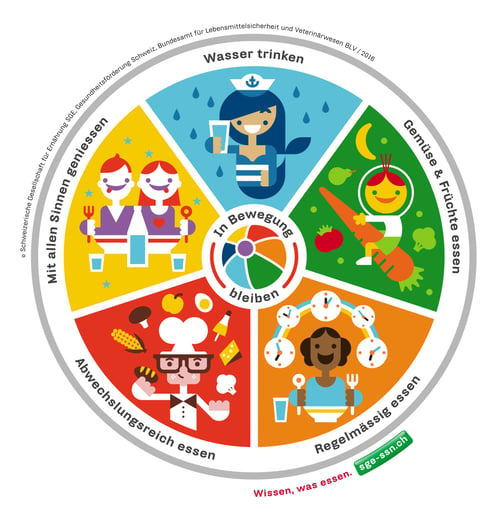Feed children a balanced diet
In the second part of our blog series "Health Promotion", you will learn why a balanced diet is just as important for the development and health of a child as regular exercise. You will also learn how we ensure a balanced diet in the kids & co daycare centres and which quick, healthy and delicious recipes you can try out.
Balanced and sustainable
Balanced eating and drinking are part of a healthy lifestyle. They provide the body with energy, vital nutrients and protective substances, promote physical well-being and help prevent disease.

The Swiss Nutrition Disc summarises the most important areas for healthy eating and physical activity behaviour in children between the ages of 4 and 12.
It includes recommendations for balanced eating and drinking. In addition, the attitude of parents and caregivers, as well as the table rituals, play an important role: A relaxed atmosphere at the table promotes well-being and enjoyment when eating. Serenity, humour and patience support a good mood around food, while criticism or pressure spoil the appetite. Inviting children to try and being a role model for them opens up a variety of taste experiences and promotes varied food choices.
The Five Areas of the Nutritional Disc
- Drink water
- Eat vegetables & fruits
- Eat regularly
- Eat a varied diet
- Enjoy with all senses
Conscious enjoyment
In order to offer children orientation and security, it is helpful to maintain different table rituals. In particular, one should always keep in mind that children imitate much of the eating behaviour of their parents.
How can you improve your child's nutrition education?
- Be positive role models: Ensure a pleasant and calm atmosphere at the table, cultivate rituals and plan enough time for
- If possible, let the children scoop their own food. However, accompany the children by paying attention to the quantity and balance on the plate.
- Encourage children to try foods they don't know, but don't force them to eat – or even to finish their plates.
- Keep regular mealtimes and follow common table rules. Table rules can be for example: "Elbows do not belong on the table" or "Wait until everyone has eaten".
- Pay attention to hygiene: wash your hands before eating, brush your teeth after lunch.
Possible table rituals
- Setting the table together
- Common beginning with a song or verse
- We name all the side dishes that are on the table.
- We always wish "Ä Guätä" ("enjoy your meal”) and then we start with scooping.
- A small dessert after the meal: this eliminates the need for discussions about sweets and snacking
- Allow straws from time to time, the skilful use of straws also promotes language development.
- On the birthday, the birthday child's favourite dish is served.
Nutrition at kids & co
In our daycare centres, we place a strong emphasis on the sustainability of the products. This means that we eat in harmony with nature and are aware of the health, ecological, economic and social effects of our food.
This is shown by the fact that we:
- Use seasonal products from the region.
- Value animal-friendly production.
- Source meat, dairy products, vegetables and fruit from Swiss production wherever possible.
- Use imported products such as fish, fruit, vegetables and cocoa from fair production and fair trade wherever possible.
- Dispose of waste in an environmentally friendly way (separate waste or compost organic waste where possible).
- Budget sufficient financial resources to ensure quality and sustainability according to this concept.
Allergies and intolerances in our day care centres
Parents inform us about allergies and food intolerances when the child is admitted. As a rule, parents bring their own allergy food with them, as we care for several children with different allergies. kids & co offers alternative food - this means vegetarian and pork-free food. We deliberately refrain from offering vegan food. As vegan cuisine only includes a limited selection of foods, there is a risk of insufficient nutrient intake for the child. In the long run, this can lead to failure to thrive and thus impair the child's health and development. The posted menu plan provides parents with information about the meals offered. In consultation with the parents, the pedagogical staff can make their own selection and omit ingredients that are not tolerated.
Our menu plan
Our menu plan is always based on the food pyramid, which determines the total daily requirement as follows:
- Vegetables, fruit and salad: 5 portions daily (1 portion is the size of a child's fist).
- Potatoes, pasta, cereals, pulses, rice, bread: 4 portions daily
- Milk and dairy products: 2 portions daily
- Meat: 1 - 2 x/week
- Fish (MSC label): approx. 2 x/month.
- Oils (cold-pressed), fats, salted food, fried food, sweets: sparingly
- Drinks: Water and unsweetened fruit or herbal tea: daily
Lore's quick and healthy recipe tips
Lore Burri works as a cook at the kids & co Salem daycare centre in Bern. In order that the children can enjoy Lore's delicious food not only in the daycare centre, she has given us some recipes that can be prepared quickly - and are healthy too!
How about:
- Pasta with zuchetti and lemon
- Polenta gratin with Gorgonzola and Tomato Garlic
- Rice with chickpeas
- Summer Vegetable Parmigiana
- Vegetarian lentil lasagne
We hope you enjoy the cooking and wish you "Ä Guätä"!

